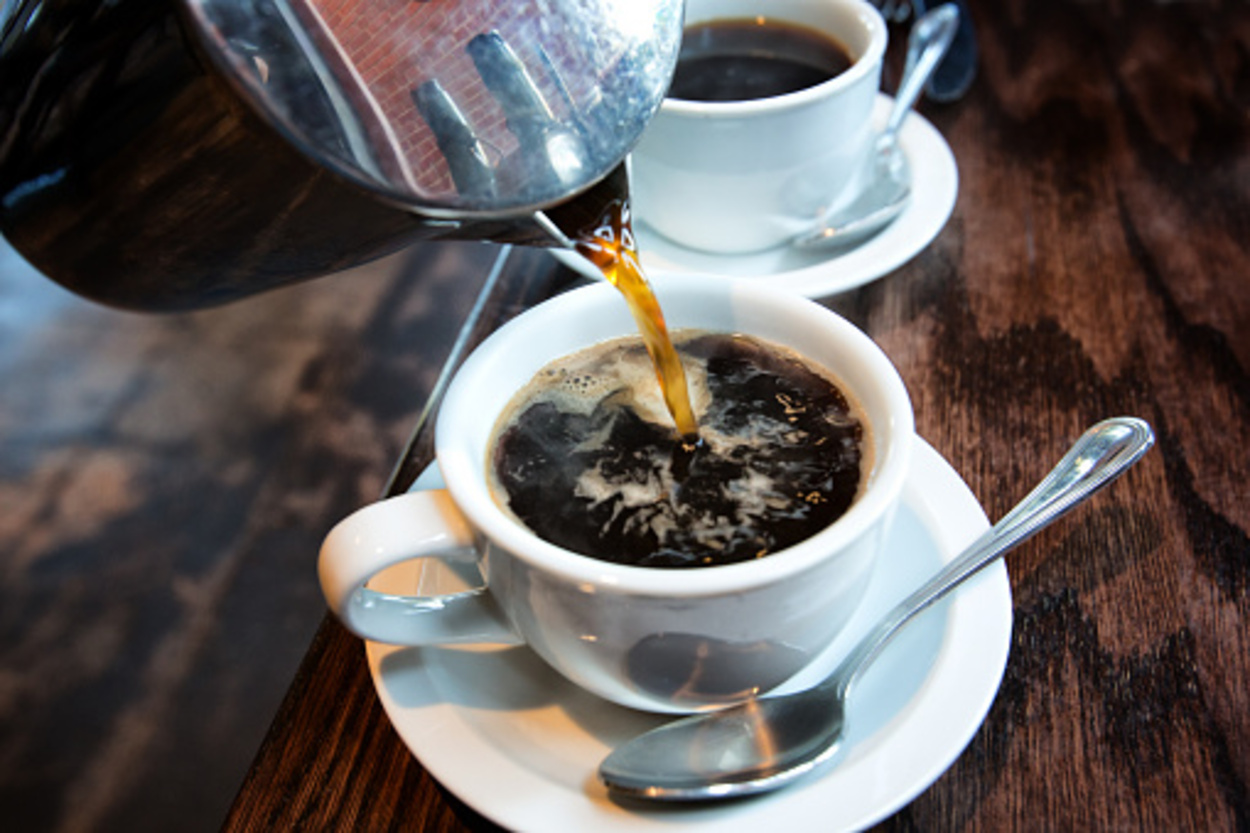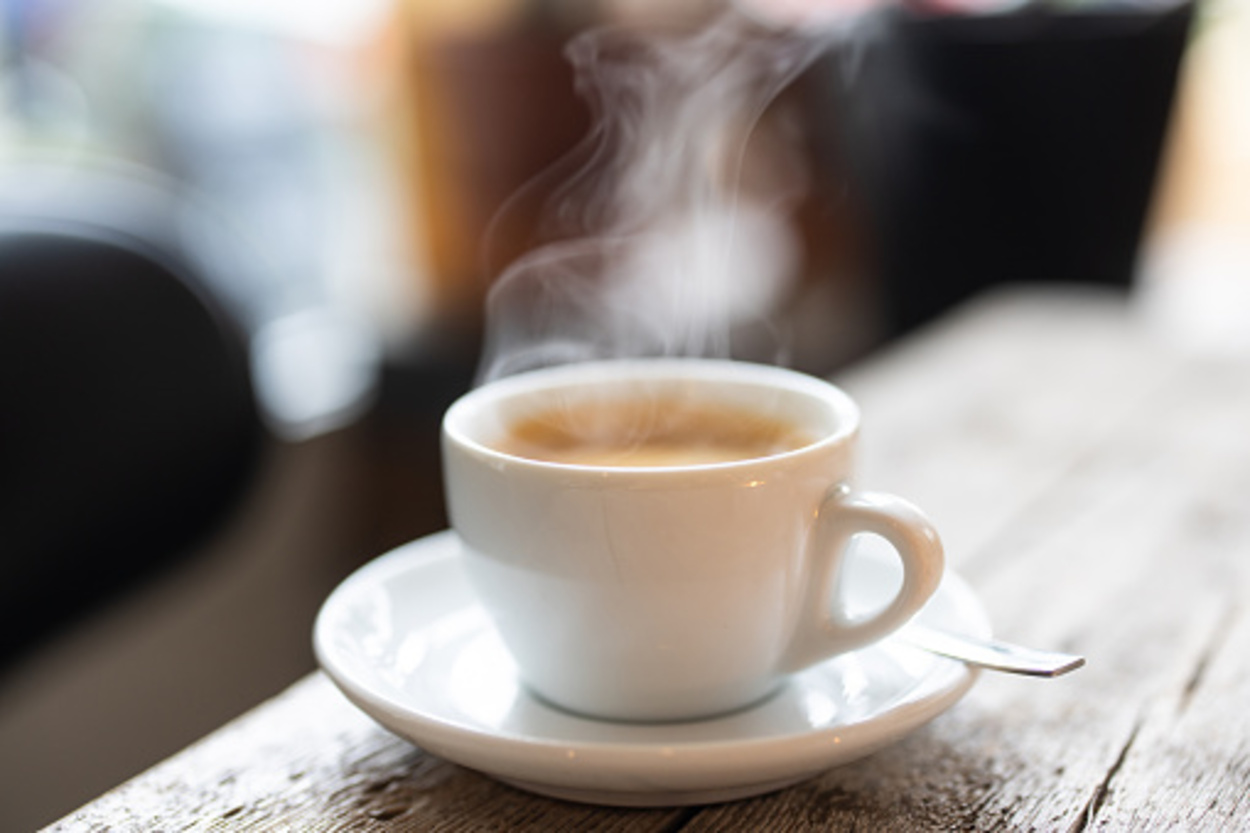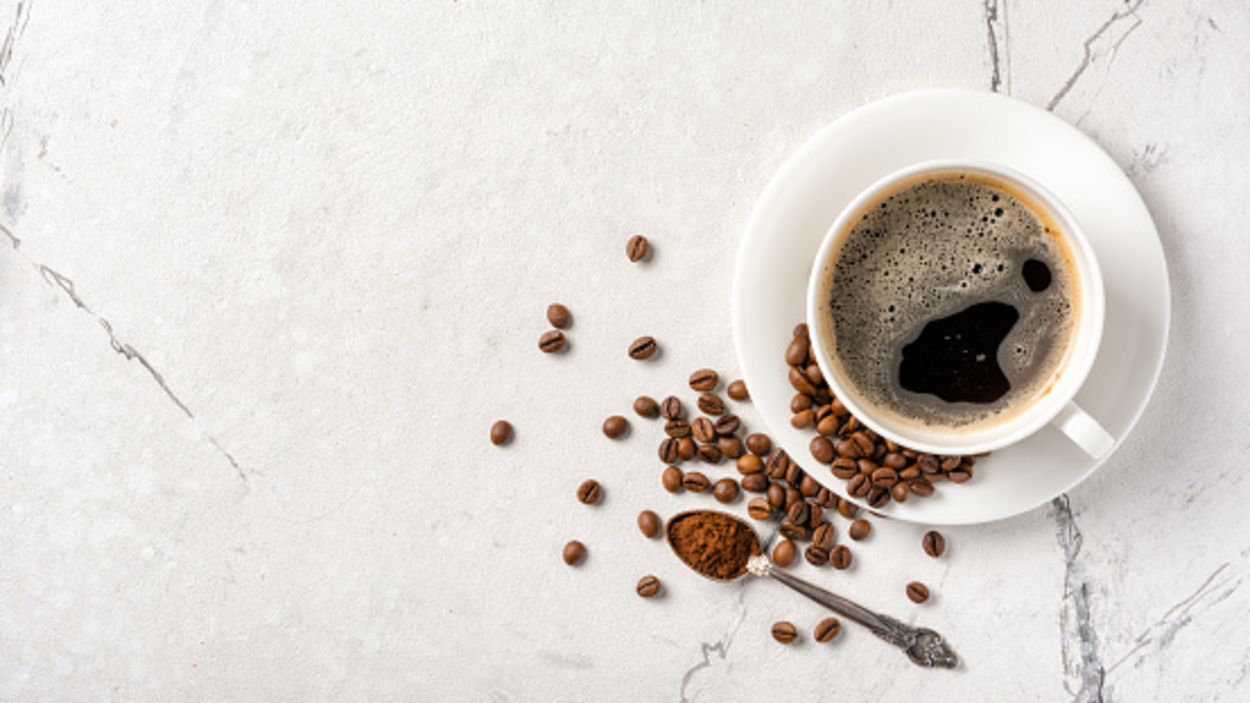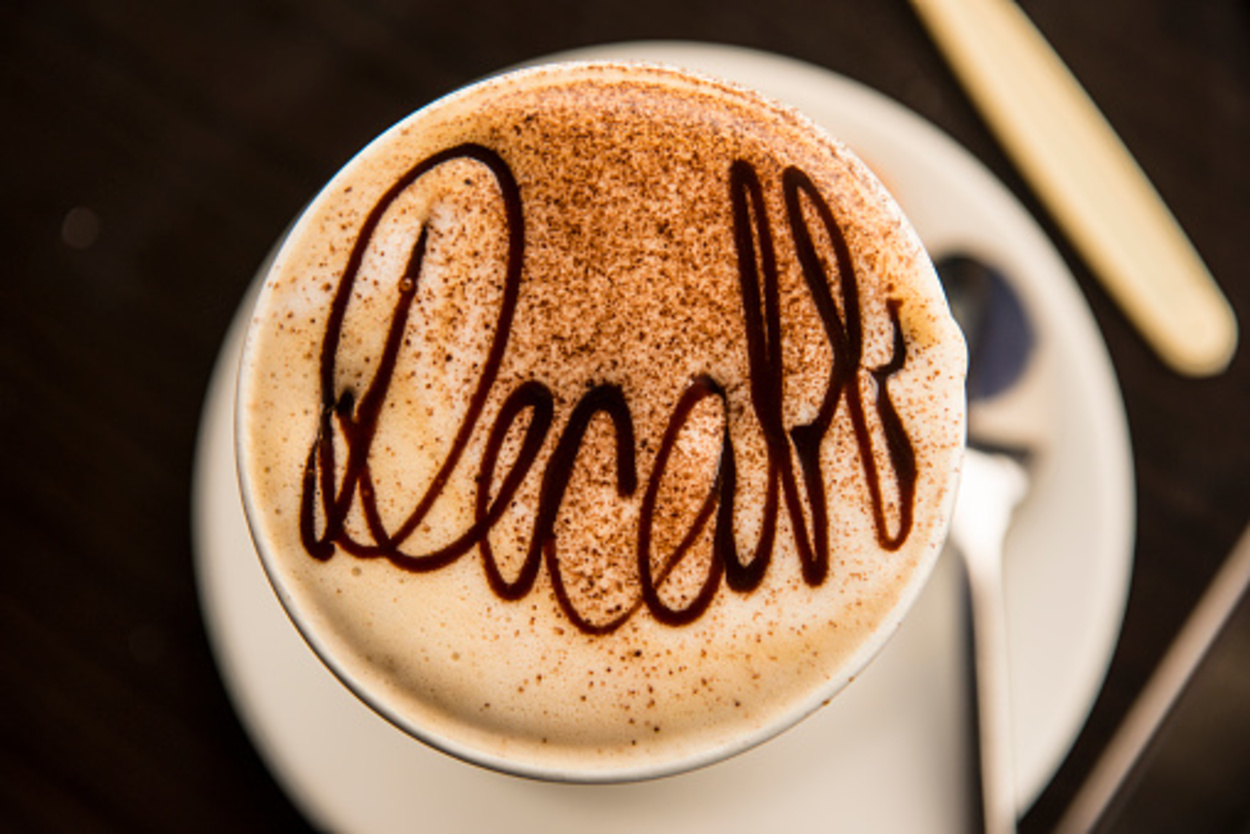If you want the healthiest (and tastiest) decaf coffee, look no further than Swiss Water decaf. The Swiss Water Process is a natural, chemical-free decaffeination method that removes caffeine in four simple steps: separate, filter, soak, and dry.
Swiss Water decaf not only provides a flavorful brew that is 99.9% caffeine-free, but it also retains the health-boosting antioxidants that make coffee so good for you! My top picks for decaf swiss water coffees are the Volcanica House Blend and Kicking Horse coffee.
I also like:
- Kicking Horse Coffee (Swiss Water Processed)
- Verena Street Whole Bean, Swiss Water Process Decaf Beans
- Volcanica Ethiopian Yirgacheffe Decaf Coffee
- Koa Coffee Swiss Water Process Decaf Kona Coffee
- Volcanica Costa Rica Tarrazu Decaf Coffee
- Grounds and Hounds Single Origin Peruvian Decaf
- Volcanica Sumatra Mandheling Decaf Coffee
- Volcanica House Blend Decaf Coffee
Keep reading to learn more.
What Is Swiss Water Process Decaf?
This method of extracting caffeine from coffee beans is unique in that it does not use solvents.
Caffeine extraction is dependent on the solubility of the green coffee beans and the movement of water (osmosis).
To better understand how the Swiss Water Method works, the following procedure for extracting caffeine from the addition of GCE to roasting is provided:
To extract the caffeine, the green coffee beans are pre-soaked in a caffeine-free green coffee extract (GCE).
The liquid used in the pre-soaking is removed from the coffee columns once the coffee beans have expanded by 100%. This liquid is returned to its original container.
After the pre-soaking liquid is drained, caffeine-free green coffee extract (GCE) from another tank is pumped into the coffee columns. The counter-current extraction process is started with this solution. Take note that the GCE is high in water and soluble coffee components.
Decaffeination is the process of driving caffeine from green coffee beans to the GCE by controlling the time, temperature, and flow.
The decaffeinated coffee beans (newest, fourth tank) are packed in the multizone dryer.
An evaporative drying process is used to remove moisture from coffee beans. The moisture in the coffee beans is converted into vapor and transferred via the air exhaust stream.
The caffeine-rich GCE is filtered by activated charcoal filters as it moves from the coffee columns to the carbon columns. After filtering, the caffeine-free GCE returns to its original tank. This solution will be used again in the following batch.
The ongoing debate about this method is whether or not the coffee beans eventually lose their distinct flavor when decaffeinated in the same solution. It occurs when the first batch’s extracted liquid combines with the juice from the second batch. As a result, flavor mixing may muffle the subtle notes in each batch.
Does the Swiss Water Process Have Caffeine?

Swiss Water coffee is caffeine-free 99.9% of the time.
That translates to a few milligrams of caffeine per cup, which is nearly zero when compared to the 100 mg or more found in an 8-ounce cup of caffeinated coffee.
There are about four types of decaffeination processes in the market right now:
| Decaffeination Process |
| Direct Solvent Process |
| Indirect Solvent Process |
| Swiss Water Process |
| Carbon Dioxide Process |
What Brands Of Decaf Coffee Are Swiss Water Processed?
Let me give you a little ‘How To Choose’ guide to Swiss water processed decaf brands:
Decaffeinated coffee can be difficult to come by. Because caffeine is a naturally occurring compound in coffee, purists may argue that it’s an essential component of the flavor and that removing it necessarily spoils the coffee.
Regardless of how hard you try to remove only the caffeine, the coffee will inevitably lose some of the oils and flavors that make a truly delicious cup. Decaffeinated coffee drinkers will have to accept this.
Finally, decaf is more difficult to roast. The beans turn brown and lose moisture after decaffeination. As a result, they roast faster and are more difficult to control during the process.
Because most decaf beans cannot withstand dark roasting, it’s best to choose a light roast.
Now let’s look into the top eight of my favorite swiss water-processed decaf brands:
Kicking Horse Coffee (Swiss Water Processed)
Decaf Horse Coffee is a Kosher coffee that has been decaffeinated using the Swiss Water Process. It’s roasted in the rocky mountains to produce a rich, dark, and delicious coffee that can be enjoyed every morning.
Swiss water process, dark roast, whole bean. Decaffeinated coffee should be deep, dark, and delicious, just like the rest of our blends. Excellent flavor with a smooth finish
Rich, dark chocolate, cacao nibs, brown sugar, and roasted hazelnuts dominate the flavor profile and brewing method. French press, drip machine, pour-over, and cold brew are all recommended methods.
CENTRAL & SOUTH AMERICA: Grown in a socially and environmentally responsible manner by farmers with dependable businesses.
Organic, fairtrade, kosher, shade-grown Arabica coffee: coffee that is good for coffee drinkers, farmers, and the environment. 100 percent guaranteed
Roasted in the rocky mountains: It’s all deep, dark, and delicious, roasted directly beneath Canada’s towering rocky mountain peaks.
By the way, if you’re looking for a French Press, I really like this one:
Verena Street Whole Bean, Swiss Water Process Decaf Beans
This family-owned business is based in Dubuque, Iowa, and roasts its beans there.
These beans are sourced from Rainforest Alliance-certified farms, ensuring a fair deal for coffee farmers while also protecting the environment.
The 100% natural Swiss Water Process is used to decaffeinate these beans. The coffee they make has a rich, mellow flavor.
They produce a full-bodied brew with a delicious aroma and little bitterness. The roast level is medium, allowing the beans’ flavors to shine through.
Volcanica Ethiopian Yirgacheffe Decaf Coffee
Ethiopian Yirgacheffe Decaf Coffee is unique in that the majority of the crop is harvested from wild coffee trees, giving it a truly exotic flavor with pleasant acidity. This is a very complex coffee origin. Yirgacheffe is a coffee region in southern Ethiopia that produces floral and fruit-toned coffees from traditional Arabica varieties grown in the region for centuries.
FLAVOR NOTES: Aroma and cup notes of very ripe strawberry, pineapple guava, dark chocolate, distinct lavender-like flowers, and aromatic cedar. Structured roundly sweet, with a gentle and pleasing bitter edge. The mouthfeel is full and plush. Lavender and chocolate dominate the finish, which is lightly and pleasantly tinged with spirits.
The Decaffeination process uses swiss water. The Swiss Water Process is a taste-driven, chemical-free decaffeination process that yields 99.9% caffeine-free Ethiopian Yirgacheffe Decaf Coffee.
Koa Coffee Swiss Water Process Decaf Kona Coffee
Koa Coffee’s Kona coffee is decaffeinated with Swiss Water. This decaf coffee highlights the rich flavors of coffee beans grown on the slopes of Mauna Loa. When you open the bag and even before you put hot water in your cup, you can smell it.
If you prefer your coffee to be processed with as few chemicals as possible, you’ll appreciate the fact that our decaffeinated Kona Coffee is Swiss Water Decaffeinated. If caffeine interferes with your sleep, this is an excellent choice for the evening. To reduce caffeine while still enjoying 100% Kona coffee, some of our customers mix it half and half with their favorite Kona.
If you’ve tried decaf before and didn’t like the flavor, ours will not let you down. It has all of the rich Aloha flavors you love, but none of the caffeine. Roasted to a perfect medium roast to highlight the flavor unique to the Mauna Loa volcano slopes where Kona Coffee beans are grown.
Volcanica Costa Rica Tarrazu Decaf Coffee
This is the decaffeinated version of the Costa Rica single-origin coffee. The Swiss Water Process is used to remove the caffeine content of the Costa Rica Tarrazu. It’s traditionally processed wet and dried on patios.
Originating in the high Tarrazu mountain ranges south of San Jose. The Tarrazu mountains and cool temperatures provide a full-bodied and extremely lively finish, as well as a smooth, bright cup with a well-balanced flavor and a subtle chocolate flavor.
Cup Notes: Well-balanced, with a medium body and acidity.
Grounds and Hounds Single Origin Peruvian Decaf
The Swiss Water Process is used to decaffeinate the Grounds and Hounds Single Origin Peruvian Decaf. Grounds and Hounds used 100 percent Arabica coffee beans grown on farms at elevations ranging from 4,200 to 6,000 feet above sea level. To produce a delicious decaf coffee, the beans are washed and sun-dried.
It’s lightly roasted, with a medium body and low acidity. You can brew it using, the pour-over, french press, or drip method.
Volcanica Sumatra Mandheling Decaf Coffee
Sumatra Mandheling Decaf Dark Roast Coffee is the dark roast version of this excellent single-origin coffee. This is a rare Indonesian coffee that’s delightfully smooth, with a rich heavy body, low acidity, and an exotic flavor that has an intense syrupy aftertaste and earthy richness. SWISS WATER is used in the decaffeination process.
The Swiss Water Process is a taste-driven, chemical-free decaffeination process that yields 99.9% caffeine-free coffee while preserving the unique origin characteristics and flavor of this Sumatra Mandheling Decaf Coffee.
To decaffeinate coffee beans, most other methods employ chemical solvents such as Methylene Chloride or Ethyl Acetate. This process preserves the original flavor of our Sumatra Mandheling Decaf Coffee.
Volcanica House Blend Decaf Coffee
Volcanica’s House Blend Decaf Coffee is a blend of high-quality coffee beans grown in South and Central America. Swiss Water is used in the decaffeination process for this decaf blend to preserve the original aroma and flavor of the coffee beans.
South and Central America are the countries of origin.
Roasting Degree: Medium
Notes on the cup: Full, creamy body with a sweet and bold flavor.
Sweet notes on the palate
Brewing methods recommended: French press, drip, and pour-over
Is Swiss Water Decaf Healthy?

The Swiss Water decaf is a chemical-free decaf coffee that retains the majority of the precious flavor and potent antioxidants found in coffee, making it the healthiest decaffeinated coffee on the market.
Because it uses fewer chemicals than other popular methods, it is also a more environmentally friendly option.
Other popular methods of decaffeination extract the caffeine using harmful chemical solvents such as methylene chloride or ethyl acetate. These techniques harm the body and flavor of the beans. But it’s not just the taste that’s changed.
Coffee beans contain approximately 1,000 chemicals that contribute to their flavor and aroma, and the extraction of caffeine tends to remove valuable natural oils and essential antioxidants as well. As a result, the coffee beans are drier and have less flavor.
Here is a video for a better understanding of how the swiss water process works:
Is McDonald’s Decaf Swiss Water Processed?
Yes, Mcdonald’s Decaf is Swiss Water processed.
McCafe Premium Roast decaffeinated coffee is made from only high-quality 100% arabica beans that have been roasted slightly darker than medium to produce a perfectly balanced, full-bodied flavor and a rich, fragrant aroma.
Their signature blend contains only hard beans grown at high altitudes and in favorable climate conditions to allow the flavor to develop over time.

Is Folgers Decaf Swiss Water Processed?
No, Folgers decaf is not Swiss water processed.
They use the ethyl acetate direct process to decaffeinate its classic decaf instant crystals. After the caffeine is removed, they steam the beans again and set them aside for roasting.
What Is The Difference Between Decaf And Swiss Water Decaf?
The Swiss Water method does not use any chemicals, whereas many other decaffeination methods use chemical solvents such as methylene chloride (“MC” decaf) and ethyl acetate.
The Swiss process is gentle and low in toxicity. It occasionally imparts fruity flavors to the coffee. Whereas, the solvent chemical washes more flavor out of the coffee since it’s a direct contact method of decaffeination.
Final Say
If you’re craving coffee and are not willing to experience any of the side effects of caffeine, you can pick out the best decaf swiss water-processed coffees.
My top picks for decaf swiss water coffees are the Volcanica House Blend and Kicking Horse coffee.
Other Articles
- Click here to see this post’s visual story
- Is Decaf Coffee Bad For You? (Let’s Discuss)
- Coffee VS Decaf (Key Differences Explained!)
- Caffeine Overdose (The Real Truth)
- Coffee Withdrawals (Find Out)
Contents
- 1 What Is Swiss Water Process Decaf?
- 2 Does the Swiss Water Process Have Caffeine?
- 3 What Brands Of Decaf Coffee Are Swiss Water Processed?
- 3.1 Kicking Horse Coffee (Swiss Water Processed)
- 3.2 Verena Street Whole Bean, Swiss Water Process Decaf Beans
- 3.3 Volcanica Ethiopian Yirgacheffe Decaf Coffee
- 3.4 Koa Coffee Swiss Water Process Decaf Kona Coffee
- 3.5 Volcanica Costa Rica Tarrazu Decaf Coffee
- 3.6 Grounds and Hounds Single Origin Peruvian Decaf
- 3.7 Volcanica Sumatra Mandheling Decaf Coffee
- 3.8 Volcanica House Blend Decaf Coffee
- 4 Is Swiss Water Decaf Healthy?
- 5 Is McDonald’s Decaf Swiss Water Processed?
- 6 Is Folgers Decaf Swiss Water Processed?
- 7 What Is The Difference Between Decaf And Swiss Water Decaf?
- 8 Final Say
- 9 Other Articles

